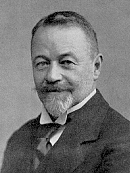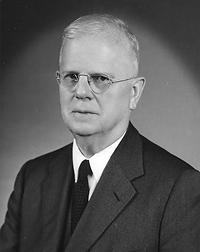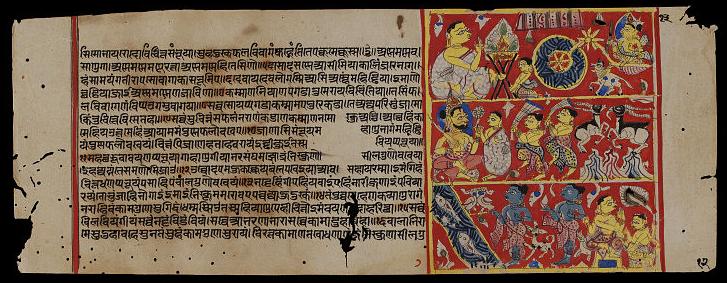This introduction to the story of Citra and Sambhūta is compiled from a summary of the tale by W. Norman Brown (Manuscript Illustrations of the Uttarādhyayana Sūtra, New Haven: American Oriental Society, 1941, pp. 18-19) and the translation of the Prakrit passages by Hermann Jacobi (Jaina Sutras II, The Sacred Books of the East Vol. 45, Oxford 1895, Reprint Delhi 2004, pp.56-61).
The Story of Citra and Sambhūta
1. Outline of the plot:
This chapter [of Uttarādhyayana Sūtra] is a conversation between king Brahmadatta and a Jain monk. The souls of these two had been associated through many existences, and the commentaries tell their story from the time when they were two herd-boys, who ministered to a hungry and thirsty monk lost in the forest and were converted by him to asceticism.
On dying they went to heaven, whence they fell to birth as twin slave boys, who died from the poisonous bite of the same snake. The two were reborn as twin fawns, who were both killed by the same arrow. They became twin swans, which a fisherman caught together in his net. Then they were born in the city of Benares as twin Cāṇḍāla (Untouchable) boys, named Citra (Citta) and Sambhūta (Sambhūya).
Their father, a Cāṇḍāla chief, saved from death a minister who had fallen in disgrace with his king, and hid him in an underground cave, where he taught the two boys all the traditional arts (halo). This minister seduced the chief's wife, was discovered, but was helped to escape by the two boys. These boys used to delight the city folk of Benares by their singing and dancing until the Brahmans had them, as Untouchables, refused entry inside the city walls. But one day they thoughtlessly entered, and there heard singing, which because of their own exquisite taste they thought despicable, and they themselves began to sing. Everyone was charmed until they recognized the lowly caste of the two; then the boys were driven out.
This experience was repeated, and the two boys left the city, determined to die; but at this moment they met a Jain monk, who led them to religion, and they took the vows. In due time they became highly proficient in the practices of the faith, and obtained supernatural powers. Once when Sambhūta entered a city, the minister who had seduced his mother saw and recognized him, and, fearful that he might betray him to his present master, sent his men to attack him. The monk, using his supernatural power, emitted fire from his mouth to burn up the men. The monarch, who was the universal emperor Sanatkumāra, came to appease him; but Sambhūta would not be mollified until his brother Citra besought him.
About the time that Sambhūta was to die Sanatkumāra's queen came to adore him, and the touch of the tips of her hair on his feet so inflamed his sensual passions that he conceived the dying wish (nidāna) for his accumulated spiritual attainments to bring him rebirth as a universal emperor so that he too might enjoy such superlative women. He was therefore in due time, after residence in a heaven, reborn as Brahmadatta, last of the universal emperors, and Citra again became a monk.
Brahmadatta had a long career of sensual excess, while Citra perfected the spiritual life. The two knew a common stanza recollected from a previous existence - a common Jain story motif - and in fairy tale fashion it finally brought them together. Citra then preached to Brahmadatta the sermon of the Uttarādhyayana chapter, but to no avail; instead Brahmadatta tempted him to forsake the good life for that of the palace with the delights of women and music.
Brahmadatta's own nemesis came about through a Brahman whom he had disgraced. The latter, seeking revenge, engaged a goatherd, who was a deadshot with a pellet bow, to shoot out the king's eyes. Brahmadatta gave orders to his minister that the eyes of the Brahman, his relatives, and other Brahmans should be torn out and put in a dish that he might have the pleasure of crushing them with his fingers. But the minister, realizing that Brahmadatta was experiencing the working out of his evil karma, substituted the fruit of the śakhoṭaka tree. Nevertheless, Brahmadatta accumulated so much bad karma that he was reborn in the seventh hell, to remain there for 33 sāgaras.
Illustrated folio from a manuscript of the Uttarādhyayana Sūtra (Stambhatirtha, Cambay, Gujarat, c. 1460). The illustration shows the story of Citra and Sambhūta (Photo by V&A Museum).
2. The Story of Citra and Sambhūta as translated by Hermann Jacobi:
Being contemptuously treated for the sake of his birth (as a Cāṇḍāla) Sambhūta took, in Hastināpura, the sinful resolution (to become a universal monarch in some later birth); descending from the heavenly region Padmagulma, he was born of Culanī in Kāmpilya as Brahmadatta; Citra, however, was born in the town Purimatāla in the great family of a merchant; when he had heard the Law, he entered the order. (1, 2)
In the town Kāmpilya, both Sambhūta and Citra (as they were called in a former birth) met again and told each other the reward they had realised for their good and bad actions. (3)
The universal monarch Brahmadatta, the powerful and glorious king, respectfully addressed the following words to him (who had been) his brother (in a former birth): (4)
We were brothers once, kind to each other, loving each other, wishing well to each other. (5)
'We were slaves in the country of the Daśārṇas, then antelopes on mount Kālaṅgara, then geese on the shore of Mṛtagaṅgā, and Śvapākas in the land of Kāśi. (6)
'And we were gods having great power, in the regions of the gods. This is our sixth birth, in which we are separated from each other.' (7)
"Karman is produced by sinful thoughts, and you have entertained them, O king; it is by the influence of this Karman that we were separated." (8)
'I had done actions derived from truth and purity, and now I enjoy their effect; is this also true in your case, Citra?' (9)
"Every good deed will bear its fruit to men; there is no escape from the effect of one's actions. Through riches and the highest pleasures my soul has got the reward for its virtues. (10)
"Know, Sambhūta, that you have got the reward of your virtues in the shape of great wealth and prosperity; but know, O king, that is just so with citra; he also obtained prosperity and splendour. (11)
"A song of deep meaning condensed in words has been repeated in the midst of a crowd of men, (having heard) which monks of piety and virtues exert themselves in this (religion): I have become a Śramaṇa." (12)
'Renowned are my beautiful palaces Ucca, Udaya, Madhu, Karka, and Brahman: this house, full of treasures and containing the finest products of the Pañcālas, O Citra, regard it as your own! (13)
'Surround yourself with women who dance, and sing, and make music; enjoy these pleasures, O monk; I deem renunciation a hard thing.' (14)
As the virtuous Citra, for old friendship's sake, loved the king who was attached to sensual pleasures, and as he had at heart his welfare, he spoke to him the following words: (is)
"All singing is but prattle, all dancing is but mocking, all ornaments are but a burden, all pleasures produce but pains. (16)
"O king, pleasures which the ignorant like, but which produce pains, do not delight pious monks who care not for pleasure, but are intent on the virtues of right conduct. (17)
"Excellent king, the lowest caste of men is that of the Śvapākas, to which we twice belonged; as such we were loathed by all people, and we lived in the hamlets of Śvapākas. (18)
"In that miserable birth we lived in the hamlets of Śvapākas, detested by all people; then we acquired the Karman (the fruit of which we now enjoy). (19)
"You are now a king of great power and prosperity, enjoying the reward of your good actions; put from you the transitory pleasures, and enter the order for the sake of the highest good! (20)
"He who in this life has done no good actions and has not practised the Law, repents of it in the next world when he has become a prey to Death. (21)
"As a lion takes hold of an antelope, so Death leads off a man in his last hour; neither mother, nor father, nor brother will, at that time, save a particle (of his life). (22)
"Neither his kinsmen, nor his friends, nor his sons, nor his relations will share his suffering, he alone has to bear it; for the Karman follows the doer. (23)
"Leaving behind bipeds and quadrupeds, his fields, his house, his wealth, his corn, and everything; against his will, and accompanied only by his Karman, he enters a new existence, either a good or a bad one. (24)
"When they have burned with fire on the funeral pile his forlorn, helpless corpse, his wife and sons and kinsfolk will choose another man to provide for them. (25)
"Life drags on (towards death) continuously; old age carries off the vigour of man. King of the Pañcālas, mark my words: do no fearful actions." (26)
'I, too, know just as well as you, O saint, what you have told me in your speech: pleasures will get a hold on men and are not easily abandoned by such as we are, sir. (27)
'O citra, in Hastināpura I saw the powerful king (Sanatkumāra), and I took that sinful resolution in my desire for sensual pleasures. (28)
And since I did not repent of it, this has come of it, that I still long for sensual pleasures, though I know the Law. (29)
'As an elephant, sinking down in a quagmire, sees the raised ground but does not get to the shore, so do we who long for sensual pleasures, not follow the path of monks. (30)
'Time elapses and quickly pass the days; the pleasures of men are not permanent; they come to a man and leave him just as a bird leaves a tree void of fruit.' (31)
"If you are unable to abandon pleasure, then do noble actions, O king; following the Law, have compassion on all creatures: then you will become a god on entering a new existence. (32)
"If you have no intention of abandoning pleasure, and still long for undertakings and property, my long talk has been to no purpose. I go, king, farewell." (33)
And Brahmadatta, king of the Pañcālas, did not act on the counsel of the saint; he enjoyed the highest pleasure, and (afterwards) sank into the deepest hell. (34)
But Citra the great sage, of excellent conduct and penance, was indifferent to pleasure; after he had practised the highest self-control, he reached the highest place of perfection. (35)
Thus I say.
 Hermann Jacobi
Hermann Jacobi
 W. Norman Brown
W. Norman Brown
